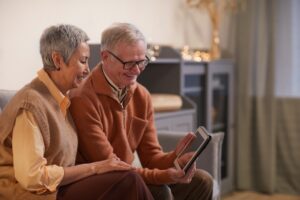
Discrimination against older people is prevalent today; the limitations imposed by society prevent them from aging in a healthy and happy way. Given this, experts agreed that it is necessary to change the way we view old age and value older people for their wisdom, learning and life lessons.
The ability of people should not be measured by their age but by their different conditions, to avoid falling into discrimination against older people, said Dr. Louise Aronson, professor of the Geriatrics Division of the University of California in San Francisco, during a press conference organized by Ethnic Media Services.
«Aging is not just about becoming older, because in reality from the moment you are born, you begin to age,»", he explained Louise Aronson.
In this regard, she said that we should avoid implying that people lose value as they age, since many people strive to eat healthily and take care of themselves just to stay young, becoming obsessed with the idea that as they age they become less beautiful, intelligent or important.
In reality, he said, aging is not a problem, as there are older people who take good care of themselves, such as those who run marathons in their 60s or beyond.
Aging in a healthy and happy way is possible, he warned, but society must understand that older people are like everyone else, with feelings and dreams, which makes them just as valuable as anyone else.
However, she said, in the case of the medical system there is a big difference in the sectors of society. There are more health programs for women, children and adults, but there is no priority for the elderly, a clear example of this is in vaccines.
«We give vaccines based on people's biology and social behaviors. We have 17 subcategories for children and we have 3 for adults from the age of 19 to 64. Anyone over 64 has only one subcategory. There is a lot of difference between ages, so it cannot be said that it is based on scientific evidence.", he commented Aronson.
In light of this, she explained that there is a need to expand research, resources and health programs for this neglected sector, while at the same time, older adults should be viewed with the same importance as others.
Cheryl Brown, chair of the Executive Committee of the California Commission on Aging, explained that the Commission works directly with the public as well as with some nonprofit organizations and private sector partners, seeking to address the needs of older people and support them in various areas.
Brown said the priorities for this year are: improving health services, increasing job opportunities, supporting older adults who are already working, addressing the issue of people who are homeless and increasing options for them.
In order to avoid age discrimination and racism, she stressed that diversity, equity and inclusion must be taken into account as basic principles in the life of each person.
The expert stressed that we must understand that equity is not equality, and older adults must be treated fairly according to their capacity.
In response to this question, Brown explained the use of the bicycle. For her, it is important to see life as riding a bicycle. If you want equality, everyone gets a bicycle, but if you want equity, everyone will get a bicycle that suits their needs, their size and depending on their ability.
Dr. Barry Reisberg, Professor of Psychiatry at NYU Langone Health and Adjunct Professor at the Center for the Study of Aging, explained the 7 stages of Alzheimer's, showing that even with the disease, people still have a useful lifespan and can even continue working during the early stages.
However, he pointed out, it is necessary to always have the support and backing of a family member to find and understand what stage one is in and decide in time when to stop working and doing various activities.
At the beginning of Alzheimer's, it may seem like a coincidence to forget where we left things or some things we had to do, but later the memory loss will be more evident, forgetting people's names, things to do and do, and even how to use the bathroom or what to eat, and it is in this last stage that a person will be needed to take care of their daily needs, he added.
Dr. Reisberg pointed out that each stage of Alzheimer's lasts approximately one to one and a half years, but it is not always the same for each person. As the disease progresses, it is very evident; there comes a time when people can only say one word a day, the ability to speak is lost, but also the ability to walk and move on their own.
Successful aging is not a real term, because there is no such thing as success, and it cannot be said that people fail as they age, the speakers agreed, and recommended talking about aging in an optimized way, that is, in the best and healthiest way possible. Given this, we all need to change the way we view older people and start to value them for the simple fact of living.
You may be interested in: Healthy community murals unveiled in North Fair Oaks

